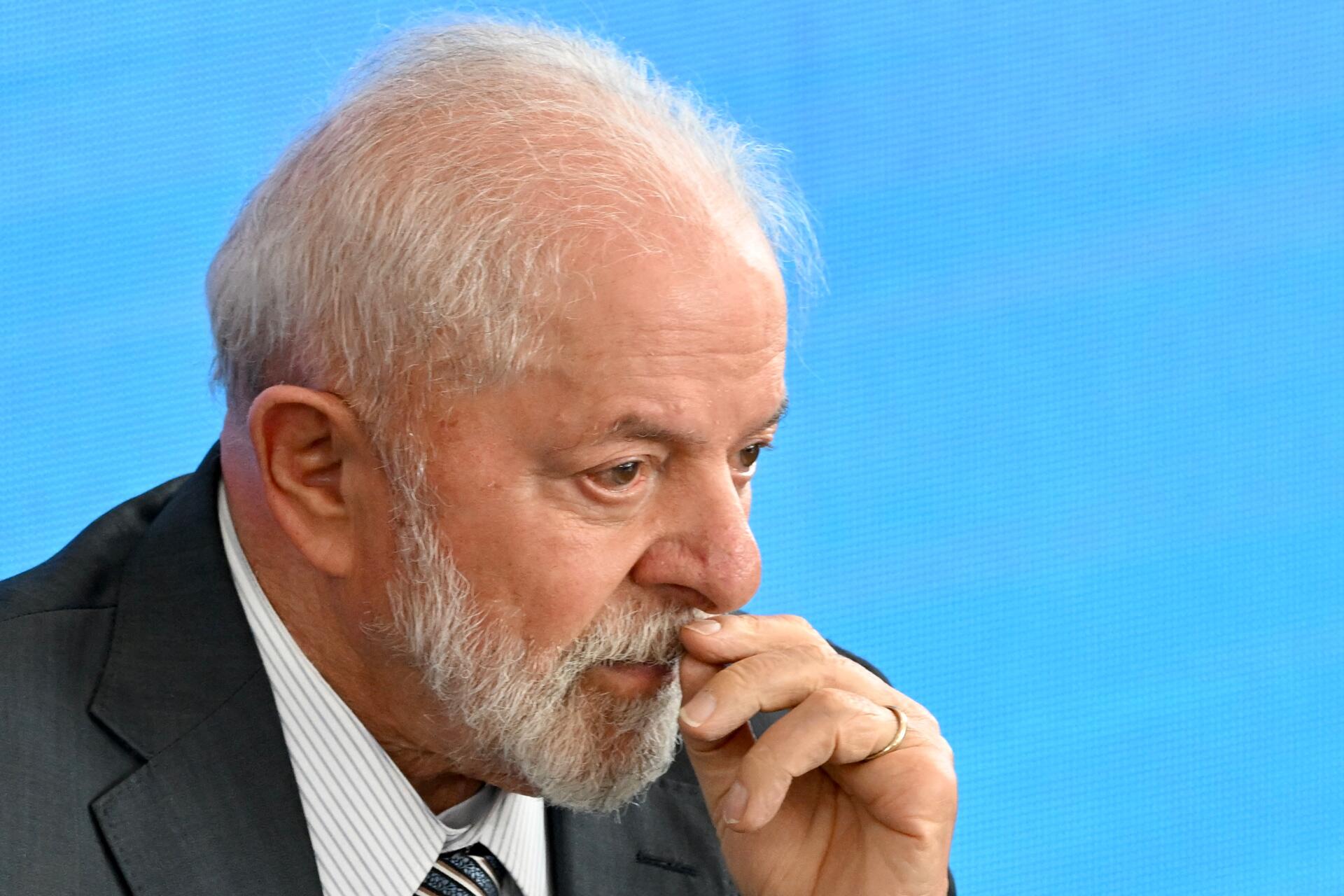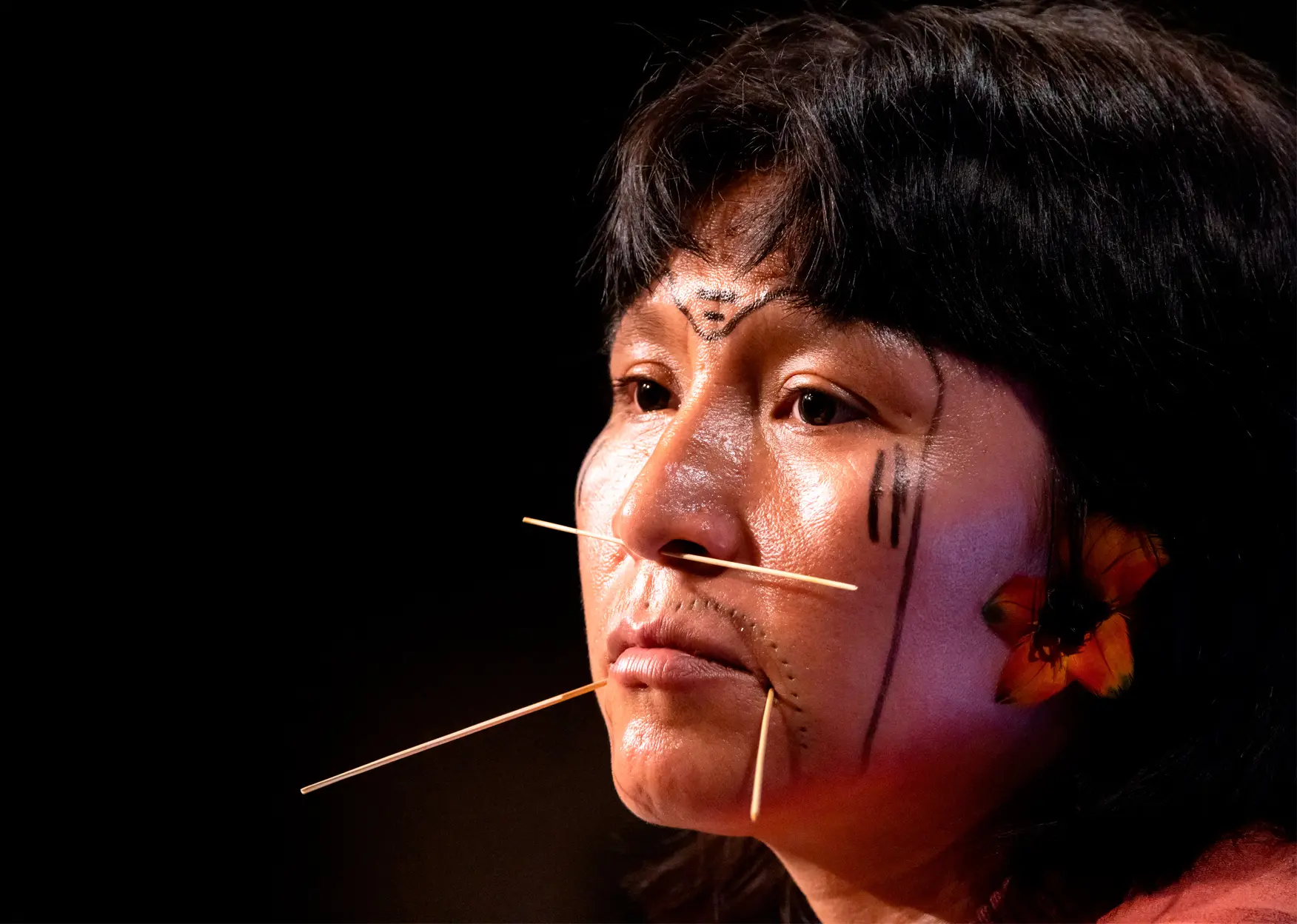We are bone tired from the struggle whose end we can’t see on the horizon. And in many ways, 2023 was a more difficult year than any other. None of us can remember so many extreme events or such intense heatwaves—nine so far in Brazil. It’s hard to report worrisome news, share alarming research, reveal frightening information—but it’s necessary. SUMAÚMA’s commitment is to the facts; it’s to the human and more-than-human peoples on the front line of this war against nature; and it’s to the children who have already been born and those yet to be born. Our commitment is to life, our own and the lives of other beings. This deep commitment to restoring the truth forces us to say that this year is ending more complicated than it began.
For those who have a Christmas break, it can be a time to reflect on their role in the scenario that is now unfolding. Unfortunately, this kind of break is a privilege for the few, partly because a large part of people are condemned to insecure, uncertain jobs and have few or no rights in an Uber-ized world. Meanwhile, in enclaves of nature, defenders of the forest and other biomes have to fortify their fragile safeguards or leave the territory, because this is the period of greatest risk to their lives—since social environmental organizations and protection agencies go on break or reduce staffing. Many of these defenders spend their “holidays” in exile inside their own countries. Others have been in exile for years already, with no prospect of returning to the land from which they were ruthlessly uprooted.
A year ago, Brazilians were cautiously optimistic about the end of the administration of right-wing extremist Jair Bolsonaro, responsible for seriously intensifying the destruction of the Amazon, Cerrado, and other biomes, an active agent in the more than 700,000 COVID deaths in the country, and a skilled fomenter of hate. We didn’t know that within a few days, on January 8, we would witness an attempted coup d’état. Our tattered democracy—which barely touches the poorest or Black and Indigenous peoples and doesn’t even consider protecting the rights of other species—survived. But it survived subjected to the most predatory Congress since the re-democratization of Brazil, dominated by the interests of large landholders and national and transnational corporations in mining, pesticides, meat, soybeans, and ultra-processed foods and, more recently, the carbon market—the new colonizing race in the Amazon, often accompanied by attempts at greenwashing.
Elected by a broad front that lives up to the name, and by a very tight margin, Lula began his third term enjoying the least political capital of all his days in office, leaving him little room to operate. Once again, in the name of “governability,” the center-left project of Lula and the Workers’ Party (PT) is becoming less left and, in some cases, less center. Since we’re only in the first year, a period in which leaders typically have more scope for action owing to their recent ballot box wins, the outlook for 2024, a year of challenging municipal elections in Brazil, isn’t good—and everything indicates that we will see more setbacks on fundamental issues.
Not to mention that we ended the year, under a democratic government, with fewer women on the Supreme Court than when we started—and without a single Black person with ties to the struggle for racial equality rights. Lula chose to pass up two historic opportunities to make the highest court in the land more in tune with the Brazilian population, comprising a black and female majority. This lack of representativity has a daily impact both on how justice is seen and on decisions that affect the lives of the population as a whole. Lula’s cabinet is also ending the year more male than it began—and with at least one minister casting a vote in Congress in favor of the genocidal thesis called the “historic cutoff point”—brutal, to say the least.
COP28 sums up how dramatic the times are. It also indicates how sick and, in a way, delusional, we are. Only rigorous research in the field of mental health could explain how a significant number of apparently lucid, well-informed people could think that a mention of fossil fuels in the Global Stocktake of the Paris Agreement was a victory, albeit a partial one. It took almost 30 years for the simple call to “transition away from fossil fuels” to finally make it into a United Nations text. That is almost three decades before oil, coal, and gas—the main causes of the climate emergency that has brought unprecedented death and destruction this year—could be named. And yet named without stipulating deadlines, targets, or resources for financing the transition. All conveniently vague.
It is as if kidnappers who are threatening your life after they have already destroyed much of your home are politely informed that they will have to stop threatening your life and destroying your home sometime in the distant future. In the meantime, they continue not only to destroy but, in some cases, extend their destruction in order to compensate for the remote moment when they will have to stop. Even so, you breathe a sigh of thanks because at least they have admitted they’re harming you and your home. That’s where we are at.
The reality is that all of humanity remains hostage to fossil fuel corporations, just as it is hostage to the corporations that produce meat, soybeans, palm oil, pesticides, and ultra-processed products. At COP28, there were seven fossil fuel lobbyists for every Indigenous person. In addition to the 2,456 delegates from the oil and gas sector, there were 475 from the carbon capture and storage industry and more than 100 from agribusiness—all in attendance to actively undermine any progress. The mention of fossil fuels had to be wrangled in—to such a degree that you can almost delude yourself into believing that what is almost nothing is some kind of victory.
Held in the oil state of Dubai, the whole COP28 seemed delusional. So delusional that Sultan Al-Jaber spared no self-congratulatory praise for the “historic decision” to mention fossil fuels in the final text. President of the summit, Al-Jaber is also CEO of the United Arab Emirates state-owned oil company Adnoc, which produced more than three million barrels of oil a day in 2022, an output it plans to increase to five million by 2027. It’s possible to agree that if Al-Jaber is happy with the COP outcome, then most of humanity is doomed to unhappiness. And yet he got a standing ovation.
The president of the world’s biggest oil producer, Joe Biden, didn’t show up at the climate convention, while representatives of the United States dedicated themselves to blocking serious progress. The world’s financial powerhouse, and one of the main culprits behind the climate abyss, pledged $17,5 million in financing for poor countries. There are Hollywood actors who earn more than that for a single film.
If a non-denialist democratic leader acts like this, what can we expect should the openly denialist far-right Donald Trump return to the presidency in the next U.S. elections, which now seems possible? Argentina’s new president, Javier Milei, is an outspoken climate denier. “All policies that blame human beings for climate change are false,” he said in October. The fact that part of a city in the province of Buenos Aires was destroyed, winds dragged a parked airliner off its stand, and at least 13 people died during a violent storm last weekend is, for him, a minor detail.
And then we need to return to Luiz Inácio Lula da Silva. Upon taking office as president of Brazil, Lula was celebrated as the world’s new ecological leader. Right at the start of his first COP as president in his third term, however, he announced he would join OPEC+, a group comprising members of the Organization of Petroleum Exporting Countries and their allies. Faced with criticism, Lula offered this rationale: “We have to convince oil-producing countries that they need to prepare for the end of fossil fuels.” It’s easier to believe in Santa Claus.

Walking contradiction: Lula began the year promising to become a global ecological leader but ended up winning a Fossil of the Day award at COP28, given by climate activists for his pro-oil policies. Photo: EVARISTO SA/AFP
It all got even worse. Just a few hours after the close of the conference, the Lula administration held what has been dubbed “the auction at the end of the world”: more than 600 oil blocks were put up for bid, some of them in the Amazon, many in areas of major environmental conflict. This move shows how seriously the mention of “away from fossil fuels” in the final document has been taken.
From the beginning of the Lula administration, it was clear that the policy of expanding oil production in Brazil, especially for export, would continue. From the beginning of the Lula administration, the only reason more headway wasn’t made on the plan to open a new exploration front in the Amazon was because Marina Silva, Minister of the Environment and Climate Change, has respected the science-based technical decisions made by the team at Brazil’s environmental agency Ibama. But what is unthinkable—oil and the Amazon in the same sentence, in the midst of climate collapse—is the government’s persistent, logical impossibility.
Since Brazil is home to 60% of the planet’s largest tropical rainforest, the country was well posed—and still is, if it radically alters its energy policy—to assume the role of global ecological leader, guaranteeing a strategic position in the production of renewables. It is true that Lula is facing fierce internal pressure in favor of fossil fuels—and that Petrobras has served the interests of its shareholders much more than those of the public. But it would be easier if that were all there was to it.
The fact is that much of the Brazilian left, as well as the global left, is still cemented in the 20th century. For Lula and a good share of the PT, oil is synonymous with money to promote social programs without making any structural changes to the country’s tremendously unequal income distribution pattern. This was the case with the export of raw materials to China, at the cost of nature, which financed the programs that led to the inclusion of millions of Brazilians into the so-called “Class C,” or “new middle class,” during Lula’s second term (2007-2010), without touching the astronomical profits of the super-rich.
Without oil, at a time when cash is tight, it will be tough for Lula to repeat the formula. Both he and many of his peers seem to have trouble understanding that there’s no way to reduce inequality without tackling the climate emergency. And there’s no way to tackle the climate emergency without halting the production and consumption of fossil fuels. Global heating is as much a product as a producer of inequality. Unless this is understood, it is extremely hard to govern in, and for, the 21st century.
In Brazil, deforestation is the biggest source of the greenhouse gas emissions that are to blame for global heating. Similarly, as shown by research cited earlier, if Brazilian beef were a country, it would emit more carbon than industrialized Japan. All this research is well known; there is no scientific doubt about any of it—but much of the Brazilian left, with Lula as its greatest representative, still thinks that promoting equality means guaranteeing workers their traditional barbecue and beer on Sundays and a car in their garage. This is so much the case that in the midst of the climate crisis, one of Lula’s policies was to expand access to cars, prioritizing individual transport powered by fossil fuels.
One should never underestimate the role of subjectivity in decisions made by power holders. The subjectivities that drive the life of Lula, a former autoworker who emerged as a leader in Brazil’s automotive union movement, seem to be taking a heavy toll and could cause Brazil to miss out on the historic opportunity to become the only power it (still) can be: an ecological power. This is primarily because Brazil’s original peoples and traditional populations are fighting on the front lines to keep the Amazon and other biomes standing, often paying with their own lives. And because we still have Marina Silva resisting inside the government. Perhaps the only reason for commemorations in 2023 comes from her team: the significant drop in Amazon deforestation.
The struggle is hard, it is ours, and it is for life. Thank you very much for supporting SUMAÚMA, even if respect for the facts and the courage to report them makes our journalism tough to stomach in days reserved for celebrating. We’ll be with you in January. Present. And, as we want the forest, standing strong.
Proofreader (Portuguese): Valquíria Della Pozza
Spanish translation: Meritxell Almarza
English translation: Diane Whitty
Photo Editor: Lela Beltrão
Layout and finishing: Érica Saboya
Editors: Viviane Zandonadi (editorial workflow and copy editing), and Talita Bedinelli (editor-in-chief)
Director: Eliane Brum

Stranded lives: this boat that couldn’t navigate Lake Puraquequara in Manaus last October, due to the extreme drought, is a metaphor for a future that has been blocked by global leaders unwilling to give up their profits from fossil fuels and from the predatory exploitation of biomes like the Amazon. Photo: Michael Dantas/AFP




